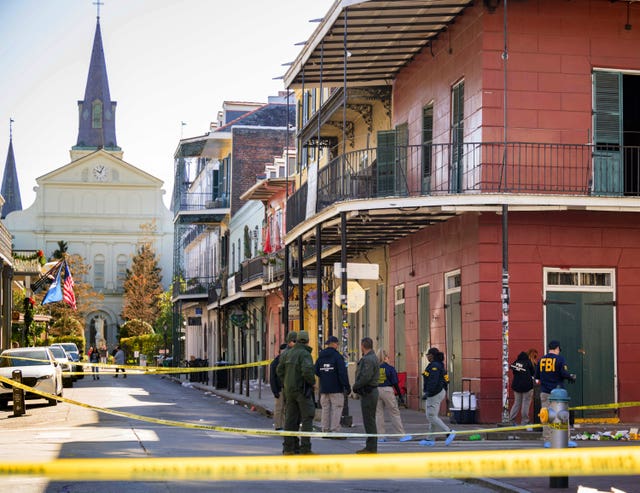Iraq detains IS suspect accused of helping to incite New Orleans ramming attack
Iraq had received requests from the US to help in the investigation of the attack in the early hours of New Year’s Day.

An official with the so-called Islamic State (IS) group has been detained in Iraq, suspected of being involved with inciting the pickup truck-ramming attack in New Orleans that killed more than a dozen people celebrating the start of 2025, Iraqi authorities said.
Iraqi authorities had received requests from the US to help in the investigation of the attack in the predawn hours of New Year’s Day in the famous French Quarter of New Orleans, Iraqi judicial officials said.
A US Army veteran driving a pickup truck that bore an IS flag sped down Bourbon Street, running over some victims and ramming others, authorities said at the time.
The Federal Bureau of Investigation identified the driver as Shamsud-Din Jabbar, 42, a US citizen from Texas, and said it was working to determine any potential associations with terrorist organisations.
After driving his pickup truck onto a pavement around a police car blocking an entrance to Bourbon Street and striking the New Year’s revellers, he crashed into construction equipment, authorities said. He then opened fire on police officers and Bourbon Street crowds, and was shot and killed by the officers, authorities said.
The FBI said shortly after the attack that it was investigating the crime as a terrorist act and did not believe the driver acted alone.

Investigators found guns and what appeared to be an improvised explosive device in the vehicle, along with other devices elsewhere in the French Quarter.
Iraqi officials said that Baghdad’s Al-Karkh Investigative Court specified the suspect who was later detained and turned out to be a member of IS’s foreign operations office.
The officials, who spoke on condition of anonymity in line with regulations, did not release the name of the suspect, only saying that he is an Iraqi citizen.
The officials said the man will be put on trial in accordance with the country’s anti-terrorism law, adding that Iraq is committed to international co-operation in fighting terrorism.
Despite its defeat in Iraq in 2017 and in Syria two years later, IS still has sleeper cells that carry out deadly attack in both countries as well as other parts of the world.
The group once attracted tens of thousands of fighters and supporters from around the world to come to Syria and Iraq, and at its peak ruled an area half the size of the United Kingdom and was notorious for its brutality.
It beheaded civilians, slaughtered 1,700 captured Iraqi soldiers in a short period, and enslaved and raped thousands of women from the Yazidi community, one of Iraq’s oldest religious minorities.





